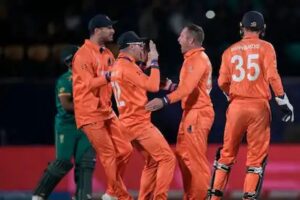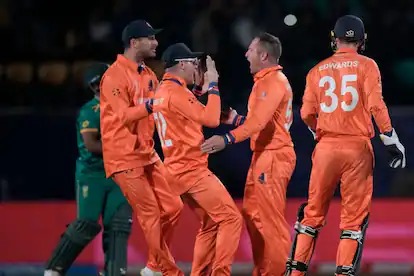
In a thrilling encounter at the HPCA Stadium in Dharamsala, the Netherlands, whose only two World Cup wins in 22 previous games had come against Namibia (2003) and Scotland (2007) pulled the rug from under South Africa’s feet in one of the biggest upsets in the competition’s 48-year history. After emphatic victories over Sri Lanka and Australia, South Africa were being talked of as serious contenders for the big prize, but in a match reduced to 43 overs a side by rain, the Netherlands eased to a 38-run victory. In truth, it wasn’t even that close, with a last-wicket stand of 41 merely delaying the inevitable.
The Netherlands had been 82-5 and then 140-7, but what followed was nothing short of extraordinary and unexpected. Scott Edwards, the captain who was born in Tonga and raised in Australia, played a fantastic innings, navigating his team through turbulent waters. Unlike some of the top-order batters, Edwards displayed remarkable patience in the middle, gradually opening up to play an array of fine strokes. His 78 from 69 balls will be etched in the memory of his teammates for years to come.
His most notable accomplice, Roelof van der Merwe, had once worn the Proteas’ jersey. It was van der Merwe that injected much-needed urgency with his aggressive heaves. Together, they played fearless cricket and all of a sudden, the Dutch team prized themselves out of the dire situation they were in earlier. Van der Merwe departed after a whirlwind 29 from just 19 balls.
At 204 for 8, there was still plenty to do, but Aryan Dutt, whose father hails from Hoshiarpur in the neighboring state of Punjab, joined the party with a display of powerful hitting, sending the ball to all corners of the park with some hefty blows. This stellar performance ensured that the Netherlands finished their innings on a high.
They carried that momentum on to the field. Both Temba Bavuma and Quinton de Kock got starts, but at no stage were the Dutch fielder subjected to a leather hunt as their Sri Lankan and Australian counterparts had been. De Kock’s miscued paddle to Edwards behind the stumps opened the floodgates, and van der Merwe then stormed through by clean bowling Bavuma.
After Aiden Markram had been bowled neck and crop by a Paul van Meekeren delivery that skidded through, van der Merwe celebrated his second when Rassie van der Dussen reverse-swept straight to backward point.
The Proteas’ hopes appeared to rest heavily on the shoulders of the destructive David Miller, who remained at the crease with the daunting task of resurrecting his team’s fortunes. However, the script took an unexpected turn as Miller struggled to dominate the bowlers as he typically does. Under mounting pressure, he eventually succumbed to a brilliantly conceived slower delivery from Logan van Beek.
Van Beek had been fortunate earlier, as the dangerous Heinrich Klaasen smashed one into the hands of the man at fine leg, but after Miller’s exit, with 101 still needed, it became about damage control. And despite fighting hands from Coetzee and Keshav Maharaj, there was no way the Ducth were about to let the game slip away.
Such a finish seemed unlikely when Bavuma sent the Netherlands in to bat after a length rain delay. Rabada reached his milestone 150th ODI wicket with a lightning-fast delivery that sent Vikramjit Singh packing. While Max O’Dowd showed promise with a few elegant boundaries, his stay in the middle was short-lived as he fell to Jansen after contributing 18.
Forming a solid partnership became an increasingly daunting task for the Dutch as wickets tumbled at regular intervals, owing to some exceptional bowling. It appeared that every South African bowler stepped up when needed, keeping the Dutch in check. It was then that Edwards, van Beek and van der Merwe had their say.
Less than a year ago, Brandon Glover and Fred Klaassen were the bowling stars as Netherlands beat South Africa by 13 runs at the T20 World Cup. Neither was in the fray this time, but that didn’t stop lightning striking twice. And this time, it wasn’t even close.




